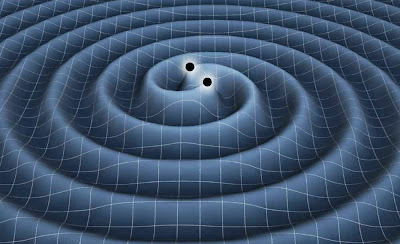This artist's illustration depicts the creation of gravitational waves from two orbiting black holes as ripples in space-time.
In March 2014, astronomers announced the first detection of long-sought gravitational waves, though some critics now say the finding could be merely dust.
Credit: NASA
The physics world was agog in March over the announcement that astronomers had possibly found ripples in space-time from the earliest moments of the universe but some scientists now question whether the findings may be nothing more than galactic dust.
If the finding of these ripples, or primordial gravitational waves, is confirmed, it would represent the best evidence yet for inflation, the idea that the universe underwent an explosive burst in size in the earliest fractions of a second after the Big Bang.
If the findings are discounted, inflation could still be correct, but scientists must provide other evidence.
A panel of well-known cosmologists debated the discovery and the model of cosmic inflation itself at an event here on Friday (May 30) at the World Science Festival, moderated by theoretical physicist Brian Greene of Columbia University in New York.
In March 2014, astronomers announced the first detection of long-sought gravitational waves, though some critics now say the finding could be merely dust.
Credit: NASA
The physics world was agog in March over the announcement that astronomers had possibly found ripples in space-time from the earliest moments of the universe but some scientists now question whether the findings may be nothing more than galactic dust.
If the finding of these ripples, or primordial gravitational waves, is confirmed, it would represent the best evidence yet for inflation, the idea that the universe underwent an explosive burst in size in the earliest fractions of a second after the Big Bang.
If the findings are discounted, inflation could still be correct, but scientists must provide other evidence.
A panel of well-known cosmologists debated the discovery and the model of cosmic inflation itself at an event here on Friday (May 30) at the World Science Festival, moderated by theoretical physicist Brian Greene of Columbia University in New York.







No comments:
Post a Comment